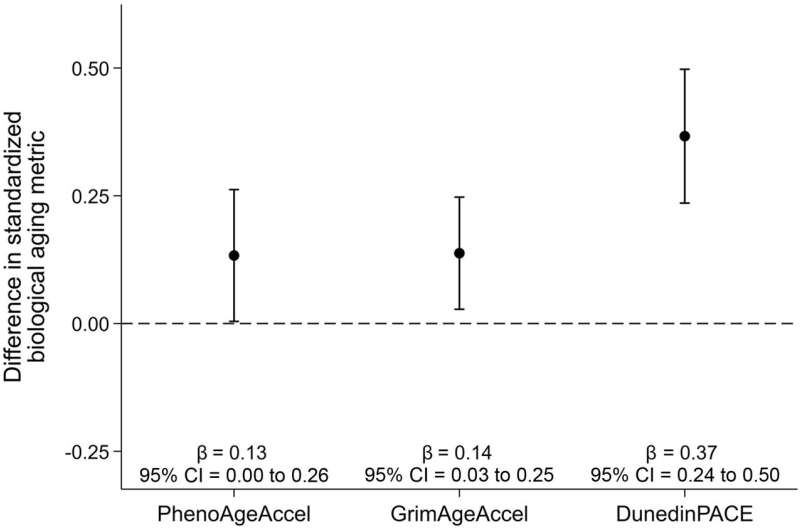This article has been reviewed according to Science X's editorial process and policies. Editors have highlighted the following attributes while ensuring the content's credibility:
fact-checked
peer-reviewed publication
trusted source
proofread
Breast cancer survivors experience faster biological aging compared to cancer-free women, study finds

One in eight women will develop breast cancer in their lifetime. The disease is treatable, especially when caught early. But what is the impact of breast cancer later in life? A Moffitt Cancer Center researcher, in collaboration with investigators at the National Institutes of Health, are working to answer that question for the nearly 4 million breast cancer survivors in the United States. In their newest study, they found that compared to cancer-free women, breast cancer survivors experience a faster rate of aging.
"Breast cancer survivors have higher rates of various age-related diseases, such as cardiovascular disease, and experience faster physical and cognitive decline than women without a history of breast cancer. In this study, we wanted to explore the biology behind this and examine whether certain cancer therapies had a greater long-term impact on survivors," said Jacob Kresovich, Ph.D., MPH, assistant member of the Cancer Epidemiology Department at Moffitt.
The study team analyzed data from women enrolled in the Sister Study, a nationwide effort led by the National Institutes of Environmental Health Sciences, part of the NIH, to identify environmental and biological factors that contribute to breast cancer risk and survival. Over 50,000 women ages 34 to 74 who had a sister diagnosed with breast cancer, but had not been diagnosed themselves, were enrolled in the study between 2003 and 2009. Participants are contacted annually to provide health updates.
At the time of enrollment, participants were asked to provide a blood sample. A sample of those who provided blood were asked to do so again five to 10 years later. The researchers studied a subset of the women that provided both blood samples. Importantly, among the 417 patients included in the study, 190 were selected because they were diagnosed and treated for breast cancer between their first and second blood draws.
Each blood sample was analyzed using three epigenetic metrics of biological aging: PhenoAgeAccel, GrimAgeAccel and DunedinPACE. These metrics use DNA methylation, a naturally occurring modification to DNA that changes across the lifespan, to measure how fast a person is aging at the molecular level.
Their results found that women who were treated for breast cancer between the blood draws had faster increases in biological aging compared to those who remained cancer free. Only small differences in aging were reported based on race and the types of tumors the women developed. There were, however, important differences when it came to treatment.
"We looked at three types of treatments used for breast cancer: endocrine therapy, chemotherapy and radiation therapy. We found a strong association between faster biological aging and those who received radiation therapy," Kresovich said. "We hope that these findings will contribute to the conversation of how to best treat and care for breast cancer survivors."
The paper is published in the Journal of the National Cancer Institute.
More information: Jacob K Kresovich et al, Changes in methylation-based aging in women who do and do not develop breast cancer, Journal of the National Cancer Institute (2023). DOI: 10.1093/jnci/djad117. academic.oup.com/jnci/advance- … jnci/djad117/7226225



















